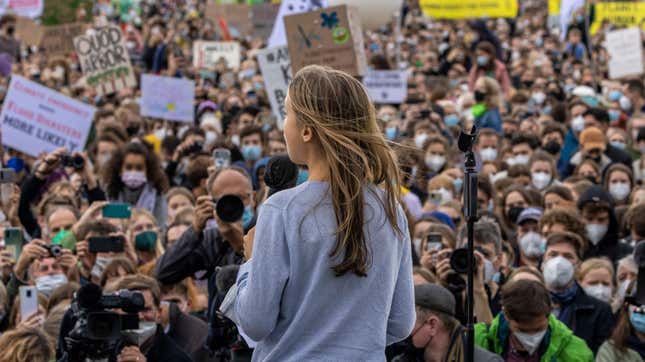
Climate solutions are complex and multifaceted. Our response to the challenges climate change poses to our world, our identity, and our way of life are even more so. It’s taken a whole book even to begin to untangle them. But the first, crucial step forward is simple. For you, for me, for every single person reading or listening to this book, there is one simple thing that we can all do:
Talk about it.
A year or so ago I was reminded of how powerful this can be. I’d just finished a talk at the London School of Economics and was heading up the aisle of the underground lecture hall when an older man named Glyn approached me. He said that he lived in Wandsworth, a borough of London, and had taken the train in specifically to hear me speak. He’d watched my TED Talk called The Most Important Thing You Can Do to Fight Climate Change Is Talk About It, and it had inspired him to have conversations about climate change with people in the borough where he lived.
I was amazed. Hearing that something I’ve done has made a difference—even just to one person—is why I do what I do. I sometimes get discouraged, and his words meant more to me than he knew. But Glyn wasn’t done yet.
He’d started keeping a record of all the people who’d joined in with these conversations, he said. “Would you like to see the list?” he asked. “Of course!” I said, surprised. I’d never heard anything like that before.
He reached in his leather satchel and pulled out a stack of papers.
I’d been expecting about seventy or eighty names. But his list recorded over ten thousand names. Now it’s upwards of twelve thousand (I checked back in with him before writing this). Twelve thousand conversations about climate change in a single English city borough, all because of one man watching one TED Talk about how important it is that we talk about why climate change matters to us and what we can do about it.
And that wasn’t all. His borough had just voted to declare a climate emergency, he said—because of the conversations they’d had. Now, two years on, they’ve also divested from fossil fuels, invested in renewables, and just before COVID they announced they’d be spending £20 million on their new environment and sustainability strategy.
What Happens When We Don’t Talk
You can do what Glyn did: use your voice to talk about why climate change matters to you, here and now. Use it to share what you are doing, what others are doing, what they can do. Use it to advocate for change at every level—in your family, your school, your organization, your place of work or worship, your city or your town, your state or your province. Use it to vote and to inform decisions your school, your business, your city, and your country can make. Talk about it in every community that you are part of and whose values and interests you share.

Talking may sound simple, almost too simple. But here’s the thing: most of us are not doing it. Even people who are alarmed and concerned about climate change tend to “self-silence” on the topic, says Nathan Geiger, a communications researcher. They want to speak up, and they know it’s important, but they can’t get the words out of their mouths.
Nathan decided to study environmental educators. These are people who are trained in communication and whose job it is to talk to the public. He found even they often hesitate to talk about climate change. And not doing so has repercussions for them; serious ones, he discovered. Many of them say they suffer from “severe psychological distress,” he writes, “as a result of not being able to connect with others by discussing a topic about which they report concern.”
How do the rest of us compare? According to polling data from the Yale Climate Communication Program, when people across the U.S. are asked, “Do you discuss global warming at least occasionally?” the answer was mostly no. Only 35 percent of people discuss it even once in a while.
What do we talk about? Things we care about. Our speech is the television screen of our mind, so to speak. It displays what we’re thinking about to others, which in turn connects us to their minds and thoughts. So if we don’t talk about climate change, why would anyone around us know that we care—or begin to care themselves if they don’t already? And if they don’t care, why would they act?
Don’t be afraid of sounding like a broken record. We learn things from hearing them, again and again. As health and communication researcher Ed Maibach has been saying to anyone who will listen for the last twenty years, “the most effective communication strategies are based on simple messages, repeated often, by many trusted messengers.” In other words, the eighth time you’ve said something, people will just be paying attention. What do people pay attention to most? In general, we tend to favor personal stories and experiences over reams of data or facts. In fact, when you hear a story, neuroscientists have found, your brain waves start to synchronize with those of the storyteller. Your emotions follow. And that’s how change happens.
Excerpted from “Saving Us,” published by One Signal/Atria Books, a division of Simon & Schuster, Inc. Copyright © 2021 by Katharine Hayhoe.